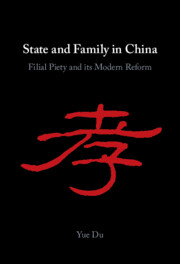
- Cited by 4
-
Cited byCrossref Citations
This Book has been cited by the following publications. This list is generated based on data provided by Crossref.
Read, Katherine and Memess, Heather 2022. Current Awareness. Legal Information Management, Vol. 22, Issue. 1, p. 67.
Chadwin, Joseph 2023. Contemporary Filiality and Popular Religion: An Ethnographic Study of Filiality Among Chinese University Students and their Parents. Open Theology, Vol. 9, Issue. 1,
Qin, Yan 2023. Opinion: Care work, migrant peasant families and discourse of filial piety in China. Frontiers in Psychology, Vol. 14, Issue. ,
Czellér, Mark 2024. Filial Affection as Political Failing: The Children of Rural Class Enemies under the Maoist Emotional Regime. Modern China, Vol. 50, Issue. 1, p. 41.
- Publisher:
- Cambridge University Press
- Online publication date:
- October 2021
- Print publication year:
- 2021
- Online ISBN:
- 9781108974479
- Subjects:
- East Asian History, Legal History, Area Studies, Law, Asian Studies, History




